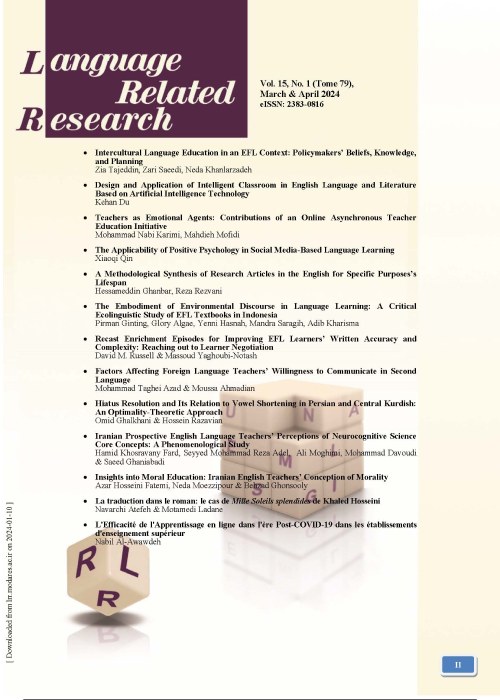The Participles of the Russian Language in the Mirror of the Persian Language
The present investigation has been tried to study participles in the structure of the Russian sentences, the current translations and although it has been provided approaches for accurate matching this category of the grammatical area in the Persian Language. In this study, the constructive method, analysis of examples and translations have been used. Regarding examining the hypothesis that the syntactic role of participles of the Russian language could be effective for correct interpreting of this case in the Persian language, 90 sentences including participles have randomly selected from novels interpreted from Russian into Persian. For instance; Home of the Gentry by Turgenev, War, and Peace by Leo Tolstoy and The Government Inspector by Nikolai Gogol were picked and the procedure of the translating was assessed, finally, the equivalents considered for the participles were examined. The principal hypothesis for the research is: could the participle, as a unit of translation in the Russian text, find a suitable equivalent among the linguistic units of the Persian language? Whether the provided translations reflect the exact meaning of the adjective verbs in the Russian language? What is the solution? The history of linguistic research in the field of the Russian language proves that the question of the lexical and grammatical characteristics of participles was very controversial. The existence or absence of this grammatical category in Persian also raises many questions, and a lot of research has been done in these areas. Despite the research done, there are still many problems in this area. The novelty of this study lies in the fact that for the first time it considers the Russian participle a translation unit when translated from Russian into Persian. Taking into account the basic rules include translating from Russian into Persian, further we will check the correctness of the hypothesis and proposals of our research. Some scholars believe that each of the morphological and syntactic structures used in the original language is an individual style of the author, and if we intend to make an original and correct translation, we must preserve the morphological and syntactic structure of the original text. In this study, it is assumed that the participle in Russian can be considered a unit of translation into Persian, and the translator can take into account the syntactic role of the participle in the sentence and choose a logical approach for its accurate translation. Based on the basic needs of translation, the following suggestions are provided for translating Russian language participles into Persian: If we have the participial constructions in a Russian sentence, to translate it into Persian we must use an explanatory dependent sentence with the conjunction "که"; If a participle precedes a noun and serves a descriptive role, it must be translated using the adjective or adjectival phrases or the adjectives formed based on verbs; In order to translate the substantive participles of the Russian language into Persian, we must use Persian nouns. In order to translate a participle that has a propositional role, we must use a conjugated Persian verb. Of the 90 examples reviewed, translation of 46 sentences matched the hypothesis of our study; however, in the translation of 44 cases, either the participle was not translated at all, or there was no exact equivalent for it, or words that do not exist in the original text were used to convey the meaning of the participle. Consideration of the research hypothesis showed that in the examples there are cases when their translation corresponded to the research hypothesis, and cases when the proposed rule was not used to translate them. We considered these cases and the possibility of correcting them using the hypothesis of our research. For example this Russian sentence «Это топор, зажаренный вместо говядины» is passive, but for it translation in Persian was used active sentence » «به جای گوشت گاو، تبر پخته اید (بازرس). Because of this, the structure and atmosphere of the Russian and Persian sentences are different. The proposed translation, corresponding to the hypothesis of our research, is as follows: «این تبری است که به جای گوشت گاو، سرخ شده». Obviously, using these two sentences in conversational situations will have different consequences for listeners. Whereas the translation should be provoked a reaction similar to the original text. In this Russian sentence: «Без сомнения, проезжающий чиновник захочет, прежде всего, осмотреть подведомственные вам богоугодные заведения.» equivalent to the composition «проезжающий чиновник» was choose «ماموری که می آید» can be replaced by a descriptive combination according to the research hypothesis «مامور در حال عبور». We will have: «بدون شک، مامور در حال عبور، قبل از هر چیز تمایل به بازدید از موسسات خیریه زیر نظر شما را خواهد داشت». The participle was made of the verb «проезжать», and the concept of passing, which is at the root of the verb, must be reflected in the translation of the participle. An analysis of existing translations and a review of the translatability of examples in accordance with the hypothesis of our study confirms the effectiveness of this hypothesis in choosing equivalents for various types of participles in Russian. The participles of the Russian language can be considered as a unit of translation into Persian. By defining the syntactic role of participles and using the hypothesis presented from this study to translate different types of participles, a step can be taken to standardize the translation of participles. In addition, it is possible to use the achievements of this research in machine and electronic translation.
- حق عضویت دریافتی صرف حمایت از نشریات عضو و نگهداری، تکمیل و توسعه مگیران میشود.
- پرداخت حق اشتراک و دانلود مقالات اجازه بازنشر آن در سایر رسانههای چاپی و دیجیتال را به کاربر نمیدهد.


